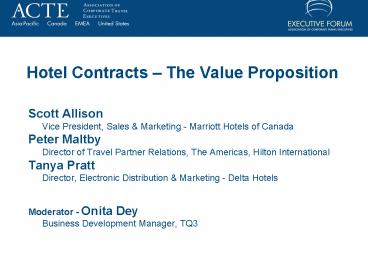Hotel Contracts The Value Proposition
1 / 9
Title:
Hotel Contracts The Value Proposition
Description:
Scott Allison. Vice President, Sales & Marketing - Marriott Hotels of Canada. Peter Maltby ... Director of Travel Partner Relations, The Americas, Hilton ... – PowerPoint PPT presentation
Number of Views:77
Avg rating:3.0/5.0
Title: Hotel Contracts The Value Proposition
1
Hotel Contracts The Value Proposition
- Scott Allison
- Vice President, Sales Marketing - Marriott
Hotels of Canada - Peter Maltby
- Director of Travel Partner Relations, The
Americas, Hilton International - Tanya Pratt
- Director, Electronic Distribution Marketing -
Delta Hotels - Moderator - Onita Dey
- Business Development Manager, TQ3
2
Hotel Contracts The Value Proposition
- PhoCusWright Inc. recently suggested that while
corporations will relax travel and budget
restrictions, corporate travel will retain a far
more disciplined ROI approach. This means that
hotels will continue to be pressured for rate
concessions or value-adds, while corporations
will be asked to improve compliance. With
transient business travel recovering more slowly
than anticipated, fierce competition for share of
wallet from key accounts will continue. At the
same time, both the supplier and the customer
will continue to carefully manage the ROI of the
relationship against the expectations outlined in
the contract.
3
Do hotel contracts still work for the corporate
travel program?
- Contracts are a valuable part of the agreement
but it is only the start of a relationship.
Compliance, however, demonstrates the ability of
the programme to move market share, fulfil the
contracted volumes and add value to the
partnership. Conditions of booking lower,
promotional rates are often not appropriate for a
business traveller even though the rate is
appealing.
4
What new technology trends are emerging and how
are they affecting how your organization buys
travel?
- Booking channels are becoming quicker and more
common place. Consistency of rates and
availability are even more important, especially
where there are multiple parties involved in the
booking process. Hotels are starting to take
control of their pricing and how they are
represented on 3rd party websites
5
Where is the integrity of contracts vs web
pricing?
- Hotels are increasingly managing their own rate
structures through the 3rd party sites and
limiting access only to those merchants who offer
transparent rates (IE the actual rate paid to the
hotel is shared with the traveller). The largest
chains are also now offering price guarantees, to
protect the traveller, the website and the chain
themselves from lost revenues and inconsistent
pricing.
6
What are some of the trends for a non-managed
corporate program?
- The use of a TMC (Travel Management Company) or
consortia agent can be one solution where volume
rates have been negotiated with Global players at
Parity. This can also be adopted in secondary
markets where volumes are too low to warrant
discounted corporate rates. Credit card and
Agency data can offer the potential for control
eventhough the programme is unmanaged
7
What are the trends towards incorporating
meetings groups into the corporate
negotiation?
- This is a growing trend in the local or domestic
market place although international conference
and incentive destinations tend to be outside the
usual travel pattern and do not form part of the
annual programme due to the nature of the event
and destination - Typically, smaller groups will be a consideration
when negotiating an annual negotiated rate as
larger groups will, be nature, demand lower price
points due to volume
8
With the diversity of hotel product ranging from
limited to full service, how can a travel buyer
use all levels of hotels within a program?
- Each hotel satisfies a different need, from long
term suite products and focused service to the
traditional International full service and
boutique hotel. Depending on budget, location or
even image every corporation is using multi
levels of product for incentive, board meetings,
road warriors, engineers etc. Loyalty programmes
across products keep the guest loyal, when he is
on business or leisure.
9
Hotel Contracts The Value Proposition
- Further Discussions?































